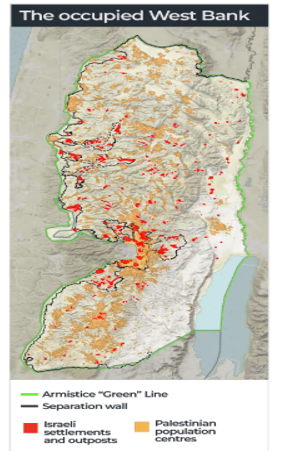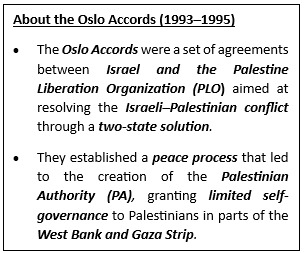SYLLABUS
GS-2: Effect of policies and politics of developed and developing countries on India’s interests, Indian diaspora.
Context: Israel’s parliament (Knesset) has given preliminary approval to a bill seeking to apply Israeli sovereignty and extend its control over the occupied West Bank.
More on the News

- The bill, titled “Application of Israeli Sovereignty in Judea and Samaria, 2025,” was approved in a preliminary reading by 25–24 votes in the 120-member Knesset and will now go to the Knesset Foreign Affairs and Defence Committee for further deliberations.
- The bill seeks to apply Israeli sovereignty to the territories of Judea and Samaria (West Bank).
- It was advanced by right-wing opposition members and some coalition lawmakers, despite direct opposition from Prime Minister Benjamin Netanyahu and his Likud party.
- India reiterated its opposition to any unilateral moves such as the annexation of the West Bank and reaffirmed its support for the two-state solution, emphasising that humanitarian assistance must flow into Gaza in an unimpeded manner.
About the West Bank
- The West Bank is a landlocked territory located in the Middle East, lying west of the Jordan River and partly bordered by the Dead Sea, with an approximate population of three million Palestinians.
- It includes key cities such as East Jerusalem, Bethlehem, Hebron, Jericho, and Ramallah.
- Along with Gaza and East Jerusalem, it forms part of the Occupied Palestinian Territories (OPT) as recognized by the international community.
• The term “Judea and Samaria” refers to the biblical regions of Judaea and Samaria.
- It is also the official name used by the Israeli government for the West Bank.
• The region is of major religious and historical significance to Judaism, Christianity, and Islam, and remains central to the Israeli–Palestinian conflict.
• Historical Background:

- Under the British Mandate (1920–1948), tensions between Jews and Arabs grew, leading to the UN Partition Plan of 1947 that proposed separate Jewish and Arab states.
- 1948 Arab–Israeli War: Following the creation of Israel in 1948, Jordan took control of the West Bank until 1967.
- 1967 Six-Day War: After seizing the West Bank (along with Gaza, Sinai, and Golan Heights) in the 1967 Six-Day War, Israel began referring to it as “disputed” territory rather than “occupied”.
- Since then, Israel has maintained military and administrative control over much of the area.
- The International Court of Justice (ICJ) and UN resolutions consider these settlements illegal under international law (Article 49, Fourth Geneva Convention).
- The ICJ’s 2024 advisory opinion reaffirmed that Israel’s occupation and settlements are illegal and called for their withdrawal as soon as possible.
- Israel disputes this interpretation, referring to the area as Judea and Samaria and claiming historical and security rights.
International Response and Legal Implications
- U.S. Opposition: The United States, Israel’s key ally, opposed the move, warning it would undermine the Gaza ceasefire efforts and jeopardise peace negotiations.
- Regional Reaction: The United Arab Emirates called the annexation a “red line”, warning it would damage regional diplomacy.
- Legal Concerns: The annexation would violate the Fourth Geneva Convention and multiple UN Security Council resolutions prohibiting the acquisition of territory by force.
• Broader Impact:
- Risks of collapsing the two-state solution.
- It could strain Israel’s ties with Western and Arab partners.
- May invite global condemnation, sanctions, or legal actions.

